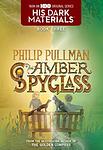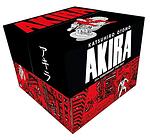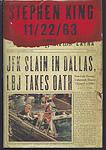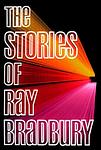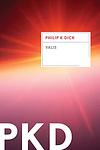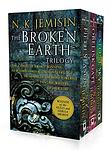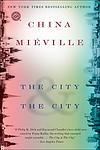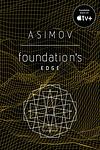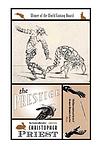The Greatest "Science fiction, Fiction" Books Since 1980
Click to learn how this list is calculated.
This list represents a comprehensive and trusted collection of the greatest books. Developed through a specialized algorithm, it brings together 300 'best of' book lists to form a definitive guide to the world's most acclaimed books. For those interested in how these books are chosen, additional details can be found on the rankings page.
Genres
Science fiction is a genre of literature that explores the potential consequences of scientific and other innovations on society and individuals. It often features futuristic or imaginary settings, advanced technologies, and scientific concepts that are not yet fully understood or realized. Science fiction can encompass a wide range of themes, including space exploration, time travel, artificial intelligence, and alternate realities. It is a genre that allows authors to speculate on the future of humanity and the impact of scientific progress on our lives.
Countries
Date Range
Reading Statistics
Click the button below to see how many of these books you've read!
Download
If you're interested in downloading this list as a CSV file for use in a spreadsheet application, you can easily do so by clicking the button below. Please note that to ensure a manageable file size and faster download, the CSV will include details for only the first 500 books.
Download-
26. The Three-Body Problem by Cixin Liu
The book is a science fiction novel that intertwines the cultural revolution of China with a complex narrative involving astrophysics, virtual reality, and alien contact. It follows a disillusioned scientist who, after suffering personal tragedy during the Cultural Revolution, sends a message into space, only to receive a response from an alien civilization on the brink of destruction. As the aliens plan their migration to Earth, a secret organization works to facilitate the invasion, while a disparate group of scientists and military personnel attempt to understand and prevent the impending extraterrestrial crisis. The novel grapples with themes of human nature, technological advancement, and the vast, often incomprehensible universe.
-
27. The Martian by Andy Weir
A gripping tale of survival and resilience, this book follows the story of an astronaut left stranded on Mars by his crew who believed him dead after a fierce storm. With limited supplies, he must utilize his ingenuity, wit, and spirit to survive and signal to Earth that he is alive. The narrative is a thrilling testament to human willpower and the relentless fight for survival against all odds.
-
28. The Amber Spyglass by Philip Pullman
The final installment in a fantasy trilogy, this novel follows the young protagonists as they continue their journey through parallel universes. They find themselves in the world of the dead, where they lead a rebellion against the oppressive authorities. Meanwhile, celestial forces are gathering for a final, apocalyptic battle. The young heroes must also confront their own destiny, which is tied to a mysterious object known as the amber spyglass. The story explores themes of love, sacrifice, and the nature of consciousness.
-
29. Replay by Ken Grimwood
The novel centers around a man who experiences an extraordinary phenomenon: after dying of a heart attack, he awakens as his younger self in college but with all his memories intact. He relives his life with the knowledge of the future, making different choices and experiencing alternate paths, only to die again and restart the cycle. As he continues to "replay" his life, he explores the possibilities of love, wealth, and personal fulfillment, while grappling with the existential questions and the psychological toll of his unique situation. The story delves into themes of destiny, regret, and the human desire to correct past mistakes.
-
30. Akira by Katsuhiro Otomo
Set in a post-apocalyptic Neo-Tokyo, this graphic novel follows the lives of two teenage friends, Tetsuo and Kaneda, who are members of a biker gang. After a motorcycle accident, Tetsuo develops telekinetic abilities and is taken by the military, which fears his growing powers might unleash another cataclysmic event similar to the one that destroyed Tokyo years earlier. As Tetsuo's powers spiral out of control, Kaneda, along with a group of rebels and psychics, must try to stop him and uncover the secrets of a mysterious entity known as "Akira," which is at the heart of the government's experiments and the city's destruction. The narrative explores themes of power, corruption, and the quest for identity against a backdrop of cyberpunk visuals and intense action.
-
31. Consider Phlebas by Iain Banks
"Consider Phlebas" is a science fiction novel set in a vast and chaotic universe where different civilizations and species clash. The story follows a protagonist named Bora Horza Gobuchul, a shape-shifting mercenary who becomes entangled in a dangerous mission to retrieve a powerful artifact from a religious cult. As Horza navigates treacherous alliances and battles, he also grapples with questions of identity, loyalty, and the nature of humanity. With its epic scope and thought-provoking themes, the novel explores the complexities of war, morality, and the search for meaning in a universe teetering on the brink of destruction.
-
32. Station Eleven by Emily St John Mandel
"Station Eleven" is a post-apocalyptic novel that revolves around the lives of several characters before and after a devastating flu pandemic wipes out most of the world's population. The narrative jumps back and forth in time, exploring the interconnectedness of the characters' lives through their shared memories and experiences. The story also follows a traveling Shakespearean theatre company as they navigate the dangers of a collapsed civilization, emphasizing the importance of art and human connection in times of crisis.
-
33. Doomsday Book by Connie Willis
In this science fiction novel, a young historian undertakes a time-travel journey to the 14th century for academic research, only to find herself stranded amidst the onset of the Black Death. As she navigates the challenges of medieval England, her colleagues in the 21st century grapple with a deadly influenza pandemic, complicating efforts to retrieve her. The narrative weaves between the past and the present, exploring themes of human resilience, the universality of suffering across time, and the ethical implications of time travel, all while the historian and her contemporaries confront mortality, history, and their own personal crises.
-
34. Red Mars by Kim Stanley Robinson
The book is a science fiction narrative that chronicles the initial efforts to colonize Mars. It delves into the complex dynamics among the first group of settlers, who come from diverse cultural and scientific backgrounds, as they confront the challenges of terraforming the hostile Martian environment. The story explores themes of ecological transformation, political struggle, and the ethical implications of altering an alien world, while also examining the personal lives and evolving relationships of the colonists. As the settlers work to create a new society on the red planet, their actions set the stage for future generations and the emergence of Mars as a new frontier for humanity.
-
35. 11 22 63 by Stephen King
"11/22/63" is a science fiction novel by Stephen King that follows the story of Jake Epping, a high school English teacher who discovers a portal that leads to 1958. After being convinced by his friend Al to use the portal to prevent the assassination of John F. Kennedy, Jake embarks on a journey through time to change the course of history. Along the way, he falls in love with a woman named Sadie and faces various obstacles that threaten to alter the timeline he is trying to change. The book explores themes of love, loss, and the consequences of trying to change the past.
-
36. The Stories of Ray Bradbury by Ray Bradbury
This collection of 100 short stories showcases the author's unique blend of science fiction, horror, and fantasy. The tales, which span six decades of the author's career, explore themes of technology, the supernatural, and the human condition. From stories of astronauts exploring alien planets, to tales of small-town America where the extraordinary lurks just beneath the surface, the collection highlights the author's imaginative storytelling and his ability to blend the everyday with the fantastical.
-
37. Speaker for the Dead by Orson Scott Card
In the sequel to a science fiction classic, humanity faces the complex consequences of its past actions. The protagonist, a once-revered child military genius, now serves as a "Speaker for the Dead," a role dedicated to telling the true stories of the deceased. He travels to a distant world to speak for a deceased researcher and becomes embroiled in the tensions between the human colonists and the planet's enigmatic indigenous species. As he unravels the mysteries surrounding the researcher's death, he confronts his own history and seeks redemption by fostering understanding and empathy between the two intelligent species, hoping to prevent the cycle of violence and misunderstanding that has plagued human history.
-
38. Under the Skin by Michel Faber
"Under the Skin" is a novel that follows the story of a woman named Isserley who picks up male hitchhikers in Scotland. However, Isserley is not what she seems - she's actually an alien sent from another planet to capture unsuspecting men, who are then sent back to her home planet to be used as meat. The book explores themes of humanity, morality, and the ethics of the meat industry.
-
39. VALIS by Philip K. Dick
The novel follows a mentally unstable man who begins to experience visions after being hit by a mysterious pink light. Convinced the light is a divine entity named VALIS, he and his friends embark on a quest to understand and communicate with it. As they delve into philosophy, religion, and science, the boundaries between reality and delusion begin to blur, leaving both the characters and the reader questioning the nature of existence.
-
40. Bloodchild by Octavia E. Butler
"Bloodchild" is a provocative science fiction tale that explores complex themes of symbiosis, love, and power dynamics through the lens of an interdependent relationship between humans and an alien species known as the Tlic. The story is set on a distant planet where humans live as a preserved minority, and the Tlic, who are large insect-like creatures, require human hosts to incubate their young. The narrative follows a young human boy who is chosen to carry the offspring of a Tlic female, leading to a harrowing and intimate bond that challenges his understanding of autonomy, sacrifice, and connection. The novella delves into the intricate and often unsettling negotiations of personal agency and survival in a world where two very different beings are inextricably linked.
-
41. Timescape by Gregory Benford
"Timescape" by Gregory Benford is a science fiction novel that explores the concept of time travel and its consequences. Set in two different time periods, the story follows a group of scientists who discover a way to send messages back in time in an attempt to prevent an environmental catastrophe. As they struggle to communicate across time, they face numerous challenges and ethical dilemmas, ultimately raising questions about the nature of time and the impact of human actions on the future.
-
42. Parable of the Talents by Octavia E. Butler
Set in a dystopian future America ravaged by climate change and societal collapse, the novel follows the journey of a young woman who, despite facing slavery, violence, and the rise of a dangerous religious zealot, strives to build a community based on her own new belief system, Earthseed. Her vision is to create a society that can adapt and thrive amidst chaos, with the ultimate goal of taking humanity to the stars. Throughout her struggle, she documents her experiences and philosophies in the hope that they will guide future generations towards a more hopeful, resilient future.
-
43. Use Of Weapons by Iain Banks
"Use of Weapons" is a gripping science fiction novel that follows the life of a skilled and enigmatic mercenary named Cheradenine Zakalwe. The story alternates between two timelines, exploring Zakalwe's dangerous missions and his troubled past. As the narrative unfolds, secrets are revealed, and the true nature of Zakalwe's character is gradually unveiled, leading to a shocking and thought-provoking conclusion. With its intricate plot, complex characters, and philosophical undertones, this book offers a thrilling and introspective exploration of war, morality, and the human condition.
-
44. The Swarm by Frank Schatzing
"The Swarm" is a science fiction novel that explores the disastrous consequences of mankind's exploitation of the world's oceans. The narrative follows a group of scientists around the world as they try to understand a series of inexplicable, catastrophic natural disasters. They eventually discover that these events are not random but are the result of a collective intelligence in the sea, a swarm of marine life that has decided to fight back against humanity's destruction of their habitat. The book combines elements of ecological thriller, disaster novel, and speculative fiction as it explores the potential consequences of human interference with the natural world.
-
45. The Broken Earth Trilogy by N. K. Jemisin
The Broken Earth Trilogy is a captivating science fiction series set in a post-apocalyptic world where a woman with the power to control seismic activity is on a quest to rescue her kidnapped daughter. This world, called the Stillness, regularly experiences catastrophic climate change events known as Seasons, which its inhabitants constantly prepare for. The series explores themes of oppression, survival, and the human capacity for adaptation, all while providing a thrilling and poignant narrative that keeps readers engaged from start to finish.
-
46. Blood Music by Greg Bear
In this thrilling science fiction novel, a brilliant scientist creates a breakthrough in genetic engineering by developing intelligent cells that can communicate and evolve. However, when the experiment goes awry, the cells begin to multiply and spread, threatening to consume all life on Earth. As chaos ensues, a group of scientists and a young girl with a unique connection to the cells must find a way to stop the impending catastrophe and save humanity.
-
47. The City & the City by China Miéville
In a unique blend of noir detective fiction and speculative fantasy, the book explores the coexistence of two distinct cities occupying the same geographical space, yet remaining invisible to each other due to a strict set of societal rules and the mysterious force of "Breach" that enforces them. When a young woman is found murdered, a seasoned inspector must navigate the complex and often perilous overlap of these two cities to solve the crime. His investigation challenges the rigid separation of the cities, uncovering a conspiracy that blurs the lines between the two and threatens the very fabric of their existence.
-
48. Foundation's Edge by Isaac Asimov
In this science fiction novel, the protagonist, Golan Trevize, is sent on a quest to discover the origins of the Foundation, a society established to preserve knowledge and culture in the galaxy. Alongside a scholar, Janov Pelorat, and a telepathic woman, Bliss, Trevize's journey leads them beyond the boundaries of the known galaxy to two secretive worlds: Gaia, a planet with a collective consciousness, and Earth, the long-forgotten origin planet of humanity. The novel explores themes of free will versus determinism, the role of individuality within a collective society, and the search for a balanced path to galactic harmony, all while questioning the validity of the Seldon Plan, a predictive model for the future of civilization.
-
49. Dawn by Octavia E. Butler
"Dawn" is a thought-provoking science fiction novel that explores themes of identity, power, and humanity's capacity for change. Set in a post-apocalyptic world, the story follows Lilith Iyapo, a woman who wakes up after centuries of being in suspended animation to find herself among an alien race called the Oankali. The Oankali offer to help humanity rebuild, but their assistance comes at a cost: interbreeding with them to create a new hybrid species. As Lilith navigates the complex dynamics of her new reality, she must confront her own fears and prejudices while grappling with the moral implications of the choices she faces.
-
50. The Prestige by Christopher Priest
"The Prestige" is a captivating tale of rivalry and obsession set in the world of 19th-century stage magic. The story follows two magicians, Alfred Borden and Rupert Angier, as they engage in a fierce competition to create the ultimate illusion. As their rivalry escalates, both men become consumed by their craft, resorting to increasingly dangerous and unethical methods to outdo each other. Filled with twists and turns, the novel explores themes of sacrifice, identity, and the price of obsession, leaving readers questioning the nature of reality until the very last page.
Reading Statistics
Click the button below to see how many of these books you've read!
Download
If you're interested in downloading this list as a CSV file for use in a spreadsheet application, you can easily do so by clicking the button below. Please note that to ensure a manageable file size and faster download, the CSV will include details for only the first 500 books.
Download

